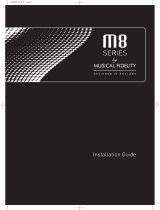
9
Getting Started
Thank you for purchasing the Rotel RA‑1570 Stereo Integrated Amplifier.
When used in a high-quality music audio system, your Rotel product will
provide years of musical enjoyment.
The RA‑1570 is a full featured, high performance component. All aspects
of the design have been optimized to retain the full dynamic range and
subtle nuances of your music. The RA‑1570 has a highly regulated power
supply incorporating a Rotel custom-designed toroidal power transformer
and custom-made slit foil capacitors. This low impedance power supply has
ample power reserves, which enables the RA‑1570 to easily reproduce the
most demanding audio signals. This type of design is more expensive to
manufacture, but it is better for the music.
The printed circuit boards (PCB) are designed with Symmetrical Circuit Traces.
This insures that the precise timing of the music is maintained and faithfully
recreated. The RA‑1570 circuitry uses metal film resistors and polystyrene
or polypropylene capacitors in important signal paths. All aspects of this
design have been examined to ensure the most faithful music reproduction.
The main functions of the RA‑1570 are easy to install and use. If you have
experience with other stereo systems, you shouldn’t find anything perplexing.
Simply plug in the associated components and enjoy.
A Few Precautions
WARNING: To avoid potential damage to your system, turn off ALL
the components in the system when connecting or disconnecting the
loudspeakers or any associated components. Do not turn the system
components back on until you are sure all the connections are correct
and secure. Pay particular attention to the speaker wires. There must
be no loose strands that could contact the other speaker wires, or the
chassis of the amplifier.
Please read this manual carefully. In addition to basic installation and
operating instructions, it provides valuable information on various RA‑1570
system configurations as well as general information that will help you get
optimum performance from your system. Please contact your authorized
Rotel dealer for answers to any questions you might have. In addition, all
of us at Rotel welcome your questions and comments.
Save the shipping carton and all enclosed packing material for future use.
Shipping or moving the RA‑1570 in anything other than the original packing
material may result in severe damage to your amplifier.
If included in the box please fill out and send in the owner’s registration
card. Also be sure to keep the original sales receipt. It is your best record
of the date of purchase, which you will need in the event warranty service
is ever required.
Placement
Like all audio components that handle low‑level signals, the RA‑1570 can
be affected by its environment. Avoid placing the RA‑1570 on top of other
components. Also avoid routing audio signal cables near power cords. This
will minimize the chance it will pick up hum or interference.
The RA‑1570 generates heat as part of its normal operation. The heat sinks
and ventilation openings in the amplifier are designed to dissipate this
heat. The ventilation slots in the top cover must be open. There should be
10 cm (4 inches) of clearance around the chassis, and reasonable airflow
through the installation location, to prevent the amplifier from overheating.
Remember the weight of the amplifier when you select an installation location.
Make sure that the shelf or cabinet can support it. We recommend installing
the RA‑1570 in furniture designed to house audio components. Such furniture
is designed to reduce or suppress vibration which can adversely affect
sound quality. Ask your authorized Rotel dealer for advice about component
furniture and proper installation of audio components.
The RA‑1570 is supplied with an RR‑AX92 remote control and must be
placed where the infrared signal from the remote can reach the front panel
Remote Sensor.
Cables
Be sure to keep the power cords, digital signal cables and regular audio
signal cables in your installation away from each other. This will minimize
the chance of the regular audio signal cables picking up noise or interference
from the power cords or digital cables. Using only high quality, shielded
cables will also help to prevent noise or interference from degrading the
sound quality of your system. If you have any questions see your authorized
Rotel dealer for advice about the best cable to use with your system.
The RR-AX92 Remote Control
Some functions can be done with either the front panel controls, or the
supplied RR‑AX92 remote control. When these operations are described,
the square call out numbers refer to the main unit, while the encircled letters
refer to the remote control.
Second Amplifier Remote Code
The factory setting is remote code 1. If you find that the remote is conflicting
with other Rotel amplifiers, you can change to remote code 2 with the
following steps.
1. From the remote control press Tuner J and 2 G at the same time to set
the remote control to send Audio Code 2.
2. Point the remote at the unit and press 2 G key for 8 seconds. The unit
will show “Audio Custom Code 1 ‑> 2”.
3. Repeat the above procedure and press “1” key instead of “2” to change
the unit back to Code 1.
NOTE: The remote control can be used to operate the basic functions
of Rotel tuners and CD players. Remote control keys labeled GHMN
can be used to operate CD or Tuner functions in your system. For the
remote to operate properly, make sure both the remote and the CD or
Tuner are both in same remote code, either Code 1 or 2.
Remote Control Batteries
Two UM-4/AAA size batteries (supplied) must be installed before the remote
control can be used. To install the batteries, remove the cover on the back of
the RR‑AX92. Install the batteries as shown in the illustration in the battery
well. Test the control for proper operation, then replace the cover. When
the batteries become weak the remote control won’t operate the RA‑1570
consistently. Installing fresh batteries should eliminate the problem.












